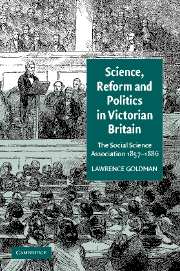Book contents
- Frontmatter
- Contents
- List of illustrations
- Acknowledgements
- Note on citations in the text
- List of abbreviations
- Introduction: the contexts of the Social Science Association
- Part I POLITICS
- Part II REFORM
- Chapter 4 Liberalism divided and feminism divided: women and the Social Science Association
- Chapter 5 Transportation, reformation, and convict discipline: the Social Science Association and Victorian penal policy 1853–1871
- Chapter 6 Victorian socio-medical liberalism: the Social Science Association and state medicine
- Chapter 7 Labour and capital: the Social Science Association, trade unionism, and industrial harmony
- Chapter 8 The Social Science Association and middle-class education: secondary schooling, endowments, and professionalisation in mid-Victorian Britain
- Chapter 9 The Social Science Association and the making of social policy
- Part III SCIENCE
- Part IV DECLINE
- Conclusion: The Social Science Association and social knowledge
- Appendix I The founders of the Social Science Association, 29 July 1857
- Appendix II Social Science Association Congresses, 1857–1884
- Appendix III Presidents of the Social Science Congresses, 1857–1884
- Appendix IV Departmental presidents, 1857–1884
- Select bibliography
- Index
Chapter 6 - Victorian socio-medical liberalism: the Social Science Association and state medicine
Published online by Cambridge University Press: 22 September 2009
- Frontmatter
- Contents
- List of illustrations
- Acknowledgements
- Note on citations in the text
- List of abbreviations
- Introduction: the contexts of the Social Science Association
- Part I POLITICS
- Part II REFORM
- Chapter 4 Liberalism divided and feminism divided: women and the Social Science Association
- Chapter 5 Transportation, reformation, and convict discipline: the Social Science Association and Victorian penal policy 1853–1871
- Chapter 6 Victorian socio-medical liberalism: the Social Science Association and state medicine
- Chapter 7 Labour and capital: the Social Science Association, trade unionism, and industrial harmony
- Chapter 8 The Social Science Association and middle-class education: secondary schooling, endowments, and professionalisation in mid-Victorian Britain
- Chapter 9 The Social Science Association and the making of social policy
- Part III SCIENCE
- Part IV DECLINE
- Conclusion: The Social Science Association and social knowledge
- Appendix I The founders of the Social Science Association, 29 July 1857
- Appendix II Social Science Association Congresses, 1857–1884
- Appendix III Presidents of the Social Science Congresses, 1857–1884
- Appendix IV Departmental presidents, 1857–1884
- Select bibliography
- Index
Summary
By our public and private endeavours we can strive to create out of State Medicine a religion of the State.
W. H. Michael, ‘Address on Health’, T.1878, 115William Farr, the doctor, sanitarian, and statistician, was present at the foundation of the Social Science Association at Brougham's house in 1857. He served on its Council, was President of its Public Health Department in 1866, and ‘found like-minded men’ at the SSA. What Eyler has termed ‘Victorian socio-medical liberalism’ in relation to Farr, or ‘the interplay of three ideas cherished among prominent Victorian professional men: political liberalism, an environmental approach to the understanding of human misery, and a belief that social progress would follow the construction of a positive science of statecraft’, captures very well the synthesis of medical reform, social improvement and expertise that characterised the outlook of public health reformers at the SSA. Though largely staffed by doctors, the department never functioned as a forum for the exchange of medical knowledge nor formulated its own ‘theory of disease’ at a time when controversy over disease causation was at its most intense. Rather, it sought to reform the institutions which influenced public health by legislation, leading the campaign for the improvement of administration which gave rise to the Royal Sanitary Commission in 1869 and subsequent legislation in 1871, 1872, and 1875.
- Type
- Chapter
- Information
- Science, Reform, and Politics in Victorian BritainThe Social Science Association 1857–1886, pp. 174 - 200Publisher: Cambridge University PressPrint publication year: 2002



